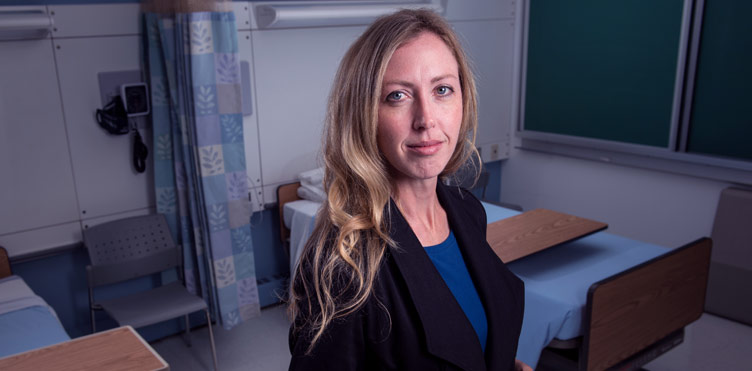
Researchers in UNB's nursing faculty have joined colleagues at universities in Canada and the US in studying a new approach to helping women who experience domestic violence.
Co-led by Kelly Scott-Storey (BN'99, MN'07, PhD'13), associate professor of nursing at UNB, the researchers are tasked with examining the effectiveness of iHEAL, an emerging model of care for those who have suffered domestic abuse.
With iHEAL, community health nurses work one-on-one with women to guide recovery, helping them to not only access appropriate services, but ensure that there is a strong focus on personal health and healing.
“iHEAL is about focusing on the woman, and helping her to gain strength and knowledge, and improve health in order to heal and move forward in her life,” says Scott-Storey. “Many of the existing services focus on safety, on legal aspects, on custody of children, and so forth. But there is never really a comprehensive focus on a woman’s overall health. We know that in order for women to effectively navigate recovery from abuse, they need to be healthy – physically and mentally.”
Scott-Storey is working with project co-leads, Marilyn Ford-Gilboe at Western University and Colleen Varcoe at the University of British Columbia, along with colleagues from UNB, McMaster University, I'Université de Montréal, and Johns Hopkins University on the research, which is being funded by the Public Health Agency of Canada..
UNB is receiving nearly $1 million, or one-third of the funding for the project. The five-year project will deliver iHEAL sessions to women from both rural and urban communities in New Brunswick, Ontario and British Columbia, and will evaluate the intervention’s effectiveness.
“One of the goals behind iHEAL is to help women develop a greater capacity to address the intrusiveness of violence in their lives,” says Scott-Storey. “Violence doesn’t just end because women have separated from their partner. There is ongoing violence, there is social isolation. There are distressing health problems, and there is the cost of getting help and services. iHEAL is intended to help women set their own priorities and address safety, health and healing, while connecting them to resources within their community.”
Early evaluations suggest the intervention is effective, Scott-Storey says. Women have described iHEAL as “a lifeline” and “life changing.”
“Women have told us that it has helped them be stronger, more capable, determined, knowledgeable and better connected to existing services,” she says. “And I know from a health perspective, women’s mental health has certainly improved. The number of women with clinical symptoms of post-traumatic stress disorder and depression have declined after going through iHEAL.”